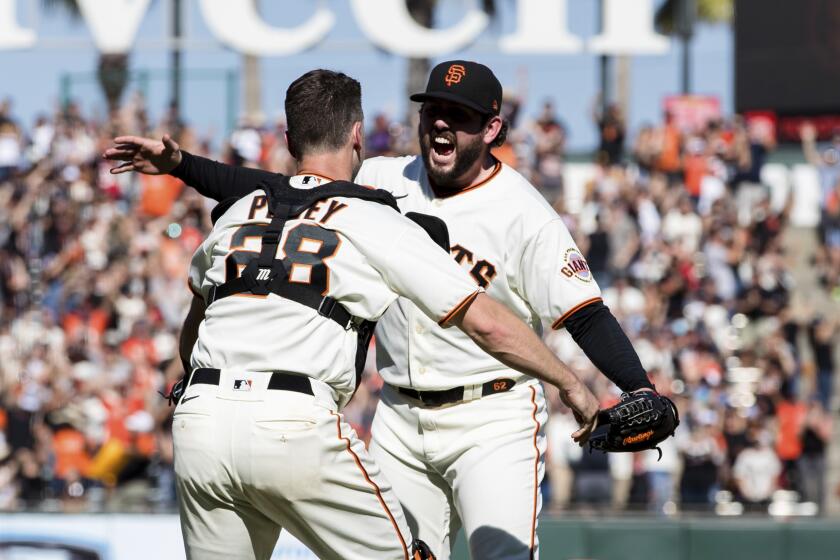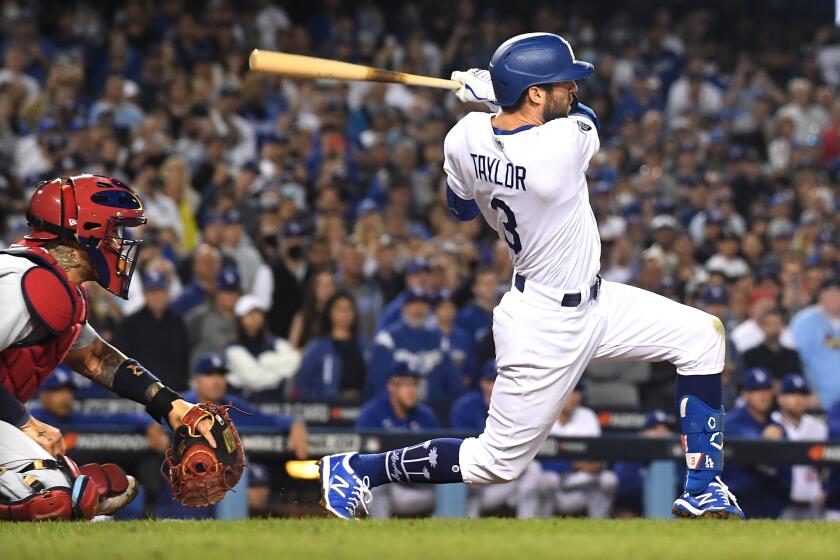Dodgers vs. Giants: Greatest rivalry in sports is about to reach another level
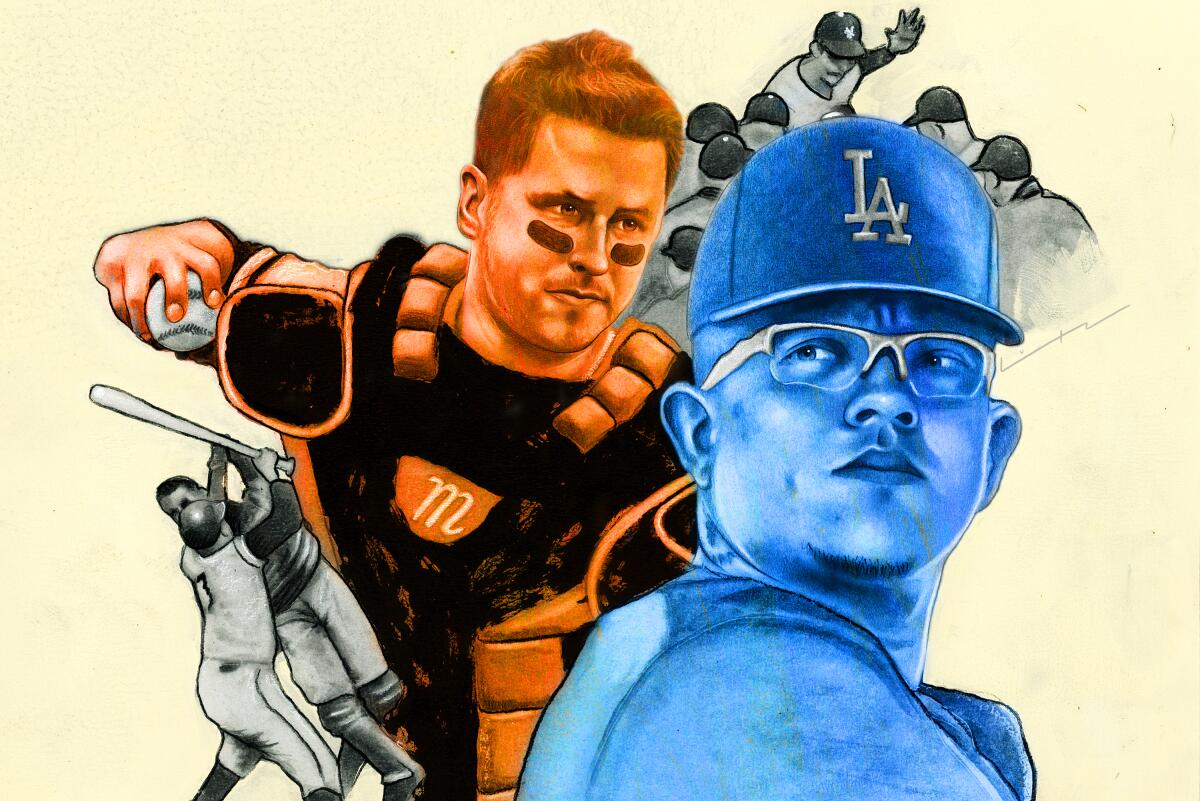
- Share via
They first met 131 years ago in Brooklyn.
They last met a month ago in San Francisco.
They have played 2,535 games, from sea to sea, through many lifetimes, across three centuries, fighting with bats, brawling with venom, fans chanting, players taunting, cities dancing, cities aching.
It is the greatest rivalry in sports. Nothing compares, nothing comes even close. No other duo can match their enduring animosity, their endless competitiveness, their relentless desire to knock the other one into the Elysian Park hills or dunk them in McCovey Cove.
And now, for the first time, the postseason.
Hallelujah, hallelujah, heavens to Roseboro, goodness gracious Marichal, it’s really happening.
Beginning Friday at San Francisco’s Oracle Park, the Dodgers and Giants will meet in the first postseason series between the teams in their history.
They’ve met twice in regular-season playoffs in 1951 and 1962, but that’s not this. They’ve played countless pennant-race elimination games, but those don’t compare.
This is a neighborhood feud gone national. This is the greatest of rivals stepping onto a giant October stage to play out their tumultuous relationship for the benefit of millions. This is a best-of-five National League Division Series, the first of three steps toward the World Series championship.
Chilling that this is finally real. Surprising that it took so long.
Other great rivalries have long since lived through this highest of drama. The Lakers have met the Boston Celtics in the NBA Finals. The New York Yankees have played the Boston Red Sox in the American League Championship Series. The Green Bay Packers and Chicago Bears have played for the NFC championship. The Chicago Cubs and St. Louis Cardinals have played in the NLDS.
The Dodgers and Giants couldn’t meet in the postseason until baseball instituted a wild-card system in 1995, so they’ve essentially circled each other for 26 years before arriving at this precious spot.
Their roster is more unsung than the Dodgers’, but the Giants are experienced, have an outstanding bullpen and optimize the platoon advantage.
Two teams that often compete against each other as if they’ve lost their marbles are now playing for all of them, and what a thing.
The Giants arrived like a shot in the dark. Their overachieving team defied the experts and the odds to record 107 wins and capture the National League West division crown.
The Dodgers, who finished with 106 wins, arrived via the Shot Heard Round the Ravine. That was Chris Taylor’s two-out, ninth-inning, game-winning home run against the St. Louis Cardinals on Wednesday night at Dodger Stadium in their single-elimination wild-card game.
From the moment Taylor’s blast soared into the left-field stands, continuing through a giddy celebration of weepy hugs and stinging champagne, everyone knew what this meant.
This meant the Giants. Bring it on. Bring them on. Finally. Now.
“It’s what baseball wants,” Dodgers manager Dave Roberts said in his first statement in the postgame news conference. “Giants, Dodgers, one of the great rivalries in sports, and it’s happening.”
Wait a minute. Did he say “Giants” first? When talking about the two teams, nobody in Los Angeles says “Giants” first. Shouldn’t that be considered grammatically incorrect?
Even though the Giants franchise has won one more World Series championship than the Dodgers franchise (eight to seven), and even though the Giants have 22 more wins in the rivalry, no self-respecting Angeleno would ever put them first.
In this space it will be Dodgers-Giants, then, now, this week, this series, forever.
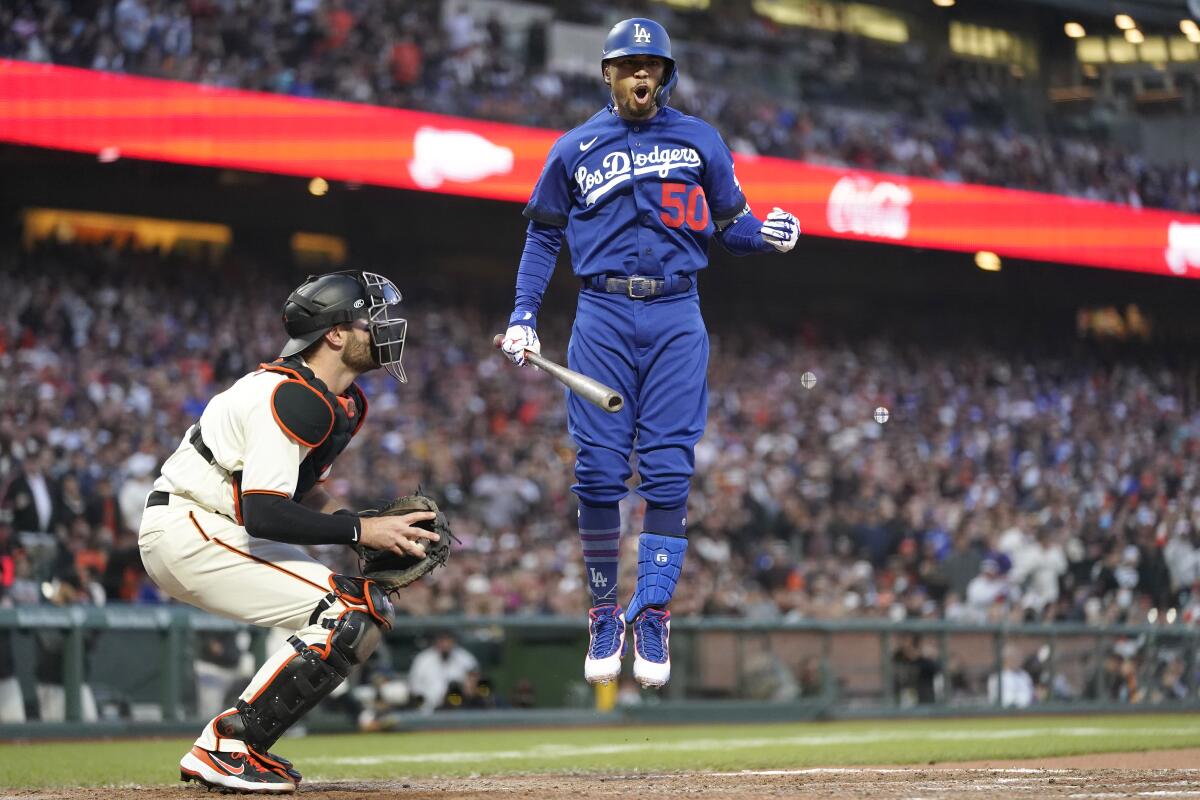
This clear prioritizing may have started with the greatest player to grace either uniform, the inimitable Jackie Robinson, a lifelong Dodger who is at the center of this rivalry’s greatest trivia question.
Q) In 1957, why did Robinson suddenly retire?
A) Because he was traded to the Giants!
Robinson never explicitly listed that as his reason for quitting, but there are enough indications and implications to believe there is truth there, and what’s a rivalry without a little intrigue?
This same prioritizing continued 64 years later, to the last weekend of this season, when both teams were playing home games in the final gasps of the division race.
Up in San Francisco, out of nowhere, with the San Diego Padres on the field at Oracle Park, Giants fans recited a chant that annually drowns out even the one from Celtics fans.
“Beat L.A.! Beat L.A.!”
Here in Los Angeles, the moment the Giants clinched the division title Sunday afternoon, with the Milwaukee Brewers on the field at Dodger Stadium, fans erupted in boos, then broke out in their own familiar chant.
“Giants suck! Giants suck!”
Those rumblings continued through late Wednesday night’s dramatic win, from several hundred fans who collected behind the Dodgers’ dugout and interrupted the Dodgers’ celebration with a chant to remind them that their postseason journey was just beginning.
“Beat the Giants! Beat the Giants!”
The players, even the ones who have barely been here, quickly understood. They have chased the Giants all season.
The Giants are run by former Dodgers executives Farhan Zaidi and Gabe Kapler. The Giants have a similar platoon system. They know each other well. They get it.
“They’ve been a great team. They won the division. They beat us,” pitcher Max Scherzer said of the Giants. “Now we have an opportunity to get them where we want them. That’s winning the postseason.”
In recent years, however, players have generally failed to grasp the ancient energy of this rivalry, and how could they?
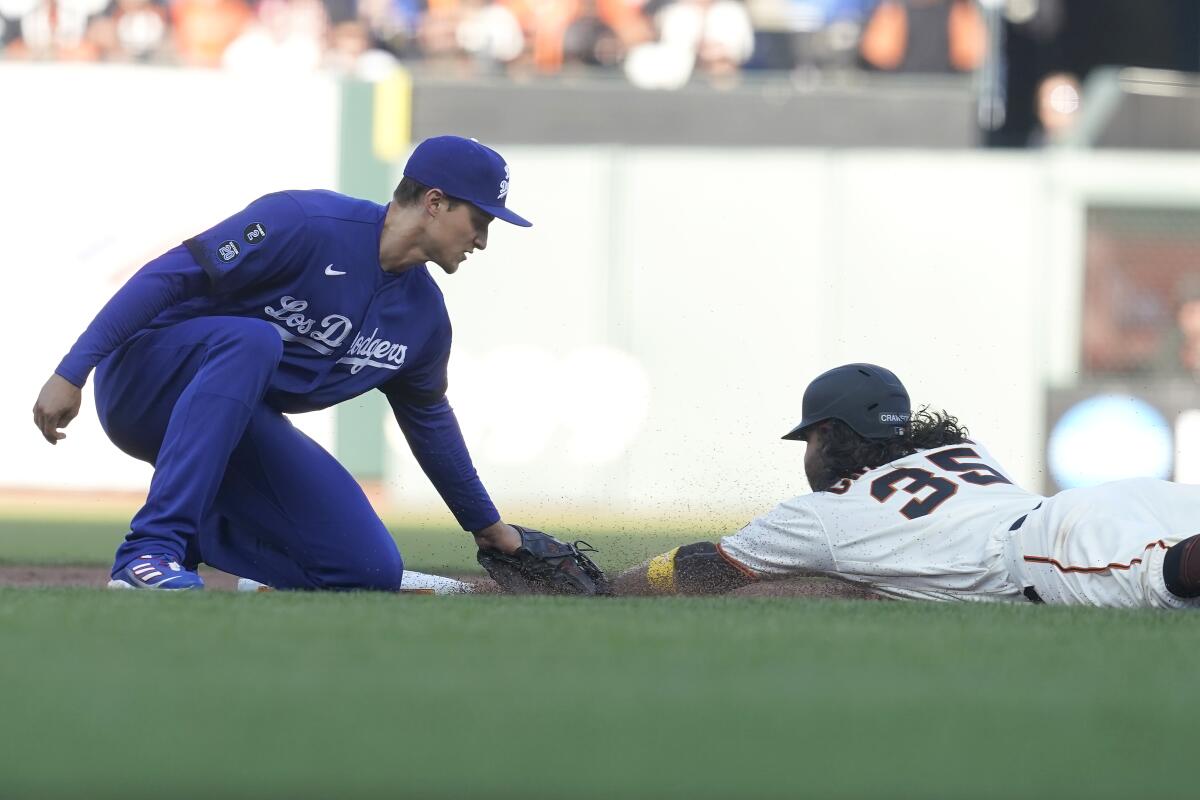
None of them were around to see Joe Morgan’s home run, or Mike Piazza’s two home runs, or Steve Finley’s grand slam, or Juan Marichal’s reckless bat, or even Barry Bonds’ pirouette.
None of them knew the late longtime Dodgers traveling secretary Billy DeLury, who would sometimes sit in the Dodger Stadium press room and reminisce about the worst day of his career.
In 1951, DeLury was working in the Brooklyn Dodgers ticket office when he was sent home from the Polo Grounds in the eighth inning of the Dodgers’ pennant-deciding playoff game against the New York Giants. The Dodgers had taken a 4-1 lead. It was DeLury’s job to return to club offices and begin preparing World Series tickets.
Yet when he exited the subway near Ebbets Field, he saw a man crying about the Dodgers.
“What happened?” asked DeLury.
“We lost,” said the man.
DeLury thought the man was drunk until he reached the offices and was given the news. During DeLury’s brief journey, Bobby Thomson had hit the game-winning home run known forever as “the Shot Heard Round the World.”
Hearing a tape of announcer Russ Hodges repeatedly shouting, “The Giants win the pennant!” is something that sticks with longtime Dodgers fans who have never even been to New York.
For this columnist, who has been witness to the rivalry for 32 years, there are other noises that linger.
Will Clark laughing. Barry Bonds barking. Madison Bumgarner grumbling. Yasiel Puig screaming. And, more than anything, Tom Lasorda bellowing.
Oh, how the Giants fans once hated Lasorda. And, oh, how he loved their hate, turning it into the greatest show in this rivalry’s history.
In the Giants’ previous home in Candlestick Park, the visiting team could access the field only from a door down the right-field line. Before every Dodgers game there during his 20-year tenure, Lasorda would exit that door and dramatically march to the Dodgers’ dugout accompanied by thunderous boos. He would wave his cap and blow kisses as the boos increased. It was a show that spoke for a rivalry. And it became a connection that eventually evolved into begrudging affection.
In his final years, by the time he reached home plate, Lasorda was often cheered for his bravado. And so, fittingly, he was invited to make one last walk at the final game at Candlestick in 1999, after which he addressed one last raucous crowd.
Elliott: For unlikely Dodgers heroes Taylor and Bellinger, the kind of moment ‘you dream about’
After struggling at the plate this season, Chris Taylor and Cody Bellinger are at the center of the Dodgers’ 3-1 victory.
“I finally figured it out,” Lasorda told them. “You don’t hate me. You hate yourselves because you really love me.”
Over the years, it is those Dodgers and Giants fans who have kept this rivalry alive. The teams have become their cities, their neighborhoods, themselves.
Dodgers fans feel they are Los Angeles. Giants fans feel they are San Francisco. As the two disparate regions clash in worlds both political and economic, so do their baseball teams, and the fans feel responsible to scream for their home.
You rarely see Giants caps in Los Angeles or Dodgers jerseys in San Francisco, and you rarely see any sort of visitors’ gear in the stands at either ballpark. There have been horrifying incidents like the beating of Giants fan Bryan Stow. Here’s praying that never happens again, and here’s demanding that everyone treat this rivalry with the roaring but civilized respect it deserves.
Dodgers. Giants. Playoffs. Three centuries of emotion squeezed into no more than five games.
Be loud. Be safe. Bring it on.
More to Read
Are you a true-blue fan?
Get our Dodgers Dugout newsletter for insights, news and much more.
You may occasionally receive promotional content from the Los Angeles Times.

